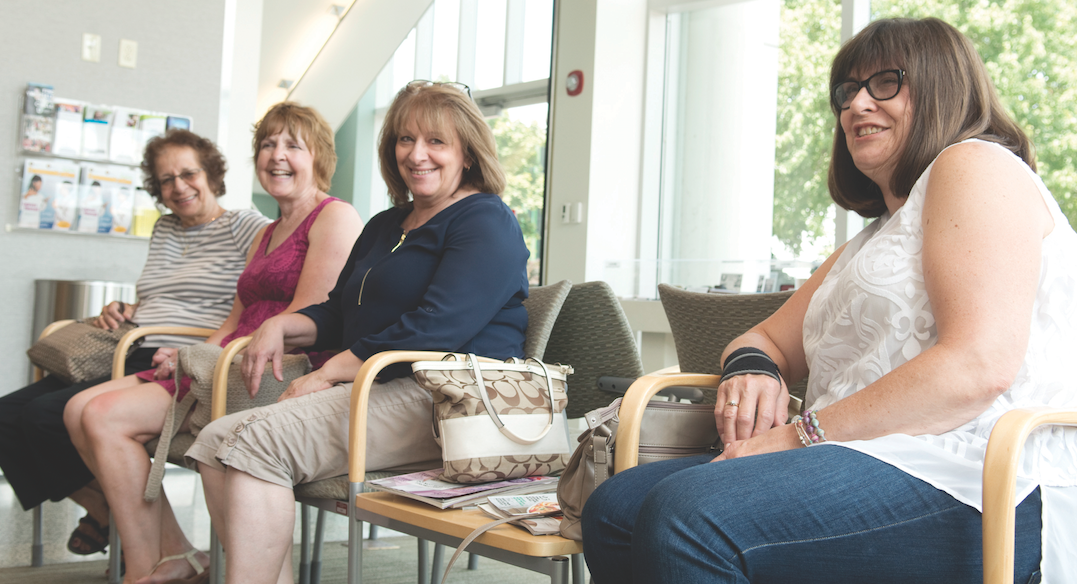A group of women sit together at the Cleveland Hearing & Speech Center in Cleveland while their loved ones complete their weekly stroke support group session.

Deb Felt, Karen Hemstreet, Vinita Saggar, Barbara Schecter, Jane Hallisy and Sue Franko aren’t just waiting. These caregivers are using this time to share worries and experiences with each other. (Photo by Maribeth Joeright)
Support Through Services
Watching your loved one go through or recover from an illness can be overwhelming as the challenge becomes how to get them the right services and resources.
Speak Easy Stroke Support Group provides therapy for those dealing with communication issues due to a disorder or stroke. Most of the attendees and their caregivers found the group through word-of-mouth or other health professionals.
“It’s been really good for her to be around others that have language issues and find that support,” says Hallisy, who, along with her siblings, cares for their mother, who had a stroke in 2009. “It’s helped her and a lot of family has said how much better she is with her communication back at home.”
Franko, who is caring for her husband, says, “I don’t know what we would do without this program. He is so involved and he won’t miss it.”
Saggar, who also is caring for her husband, says he is opening up more since coming to the group.
“There is something about survivors being in an environment that is a level playing field and that is facilitated by understanding and compassionate professionals,” says Schecter, who is the caregiver for her husband, Barry. “It is miraculous to see the improvement in the folks that participate.”
For the caregivers, support at home is essential.
For example, Schecter has safety precautions such as Life Alert and locks on the door, but she also has a home health aide who helps during the week.
“(The aide) relates to him and is very patient with him,” she says. “I don’t have to worry about something happening to him. I don’t leave him for more than an hour and a half to two hours, but it’s nice to know that I have that chunk of time if I need it.”
Help Them Get Social
While dealing with medical concerns is a priority, doing activities they enjoy, even if it’s little things, is important to their loved ones’ recovery and quality of life.
“We try very hard to keep and maintain that independence for them as much as possible,” Schecter says.
Many in the group find places to go or things to do to get their loved ones involved with others outside their normal routine. This also helps the caregivers spend time and have fun with them.
Franko says her husband attends an exercise group.
“I get my mom involved in things that we can do together,” Hallisy says. “I look for things outside, no matter the weather. We go to the garden center, to the Cleveland Botanical Gardens. We get memberships to different places so she can get out. Those memberships have really helped, (as in the case of) the zoo; she gets to go with her grandchildren.”
Take Time for Yourself
When a loved one goes through an illness, it might be difficult for the caregiver to take care of their own needs. However, their own well-being and health is important and there are many ways to help.
Hallisy, in addition to memberships to local attractions, says restaurant coupons help because then she is not constantly cooking,
“It doesn’t have to be big things,” she says, “but those things have helped me so I don’t have do everything.”
She adds texting can be a great outlet as it helps to vent any frustrations with her siblings.
“There is a lot to be said for wine and comedy,” Schecter says. “I came to the realization, whatever gets you through.”
While their loved ones attend the support group, the women have an opportunity to sit down and talk with others going through the same experiences, mostly without a facilitator.
“There are no preconceived notions,” says Hemstreet, who cared for her husband Bradley until his death last year from cancer. She still attends the support group sessions. “They are not concerned about sharing what they have been through.”
You talk to other people, you learn from them,” Sagger says. “You become stronger.”
“I choose to do this; I chose to keep her (my mom) at home,” Hallisy says about being a caregiver. “That’s what helps me when I’m having one of those moments — (remembering) this is what I chose, that I want her here.”









